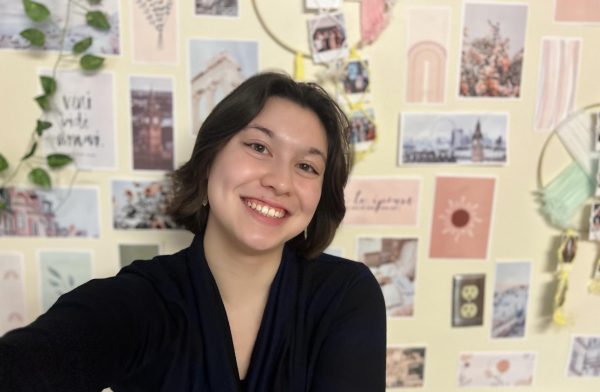On Friday, October 6 at 7:30 p.m., the international ensemble Sequentia took to the stage of Kracum Hall for their concert “Mystical Voices of Medieval Germany: Hildegard von Bingen.” Dedicated to performing early music from before 1300, Sequentia was brought to Carleton College by the Medieval and Renaissance Studies department (MARS).
“Medieval and Renaissance Studies has — I think it’s robust enough to be called a tradition, and a desire to bring music from the period to campus, or to bring students to events where early music is performed,” said professor Bill North, director of MARS and professor of history. “And over the years, starting in about 2005, we have taken people to performances, and we’ve brought Twin Cities early [musicians] to campus.”
A prominent group in the world of early music, Sequentia was formed in 1977 and has toured internationally since then. Their discography encompasses the entire Middle Ages, including nine CDs of the complete works of German abbess and composer Hildegard von Bingen, an important figure in early church history. They’ve released 30 recordings in total and have received numerous awards, including a Grammy nomination.
“Sequentia, for people who are into early music, is a very important group. […] They’ve done a lot of work, and they’ve covered a lot of the different kinds of music that are from the period,” said North. “The leader of Sequentia is a fellow named Benjamin Bagby, […] and he’s very much put Sequentia on our radar as a group that would be really neat to bring to campus.”
Conversations to bring Sequentia to campus began in 2018 with Steve Richardson, Director of the Arts, and faculty in the music department and MARS.
“We started resuming discussions seriously probably in mid-year 2021,” said North. “One of the things that is very important is that the programming, if at all possible, connects with the curriculum, so it can be more useful and enrich what we’re doing [at Carleton], as opposed to being a completely separate thing.”
Sequentia’s concert program included selections from Hildegard von Bingen’s “Hildegard’s Symphonia: To Divine Love, and A Call for Mmercy,” “Symphonia: To John the Evangelist, to the Angels, the Confessors,” “Symphonia: To Mary, Saint Ursula, the Patriarchs and Prophets,” “A Confrontation with the Devil,” and “Symphonia: Hildegard Sings to the Virgin Mary.”
Last winter, planning became concrete as dates were selected as well as which classes Sequentia would visit. They ultimately visited North’s HIST 236: “The Worlds of Hildegard von Bingen” class three times. The class examines Hildegard’s works and her contemporaries to analyze creative possibilities for women in the Middle Ages.
“I’ve wanted to do a course that focused on Hildegard for quite a while, and to bring out the interdisciplinary nature of this medieval person,” said North.
“The group arrived a week before their concert, and on Monday, Benjamin took time off [from rehearsal] and came to our class to talk both formally and informally about the evolution of early music, as a focus within the arts community,” said North.
Coinciding with Sequentia’s stay was a visit from musicologist Professor Margot Fassler, Professor Emerita in Music and Theology at Notre Dame. Her current research mostly focuses on Hildegard von Bingen, incorporating elements of theology, liturgy, drama, music and the visual arts.
“It was lovely that one of the bodies on campus that is very supportive of [visits] like this is the [Elizabeth Nason] Distinguished Women Visitors Fund. And they were really supportive of Margot Fassler coming to Carleton,” said North. “The combination of Sequentia, who is one of the only groups to do all of Hildegard’s repertoire, with Margot Fassler, who’s one of the leading experts, was this happy thing that came together in fourth week.”
Fassler visited North’s class twice throughout her stay at Carleton as well as Professor of Music Andy Flory’s Argument & Inquiry seminar, “Ways of Hearing.”
For students, these visits provided interactive engagement in the field of early music.
“We got to ask them questions about what it’s like to perform Hildegard’s music because Hildegard’s music is unusual in its [demands of] a singer,” said North. “So being able to talk with singers about how you prepare for these pieces, how you perform them, what is distinctive about Hildegard’s music… was, I think, really neat for the students.”
For faculty as well, both the performance and the discussions leading up to it added a new dimension of understanding.
“For me, the opportunity to interact with [the ensemble] for a period of time was really special,” said North. “So that was neat for me, to also understand music more deeply. I’ve read about music, I’ve taught texts that relate to music, but having people who are within that world, within the soundscape of Hildegard’s music, talk about it just brought a whole other level of understanding and appreciation.”
The week-long interaction allowed students and faculty to learn from Sequentia, Bagby and Fassler in a substantive manner.
“That was the advantage of the residency idea, where they had time and they weren’t trying to practice and get ready for their concert, and also cram in all this other stuff,” said North. “I think there was a sense that they could be generous with their time, and they were.”
“What the group commented is that they really treasure time to work together where their only responsibilities are to figure out performances, to figure out each other’s contributions to a given project,” said North. “And they really appreciated that time here at Carleton, so they all came away really appreciating both the facilities and the staff contributions at the Weitz Center.”
“It’s so rare that performers are given the chance to stay in one place, work hard, teach, meet interesting students and fellow professionals and prepare a new program for the public, working in the most perfect imaginable surroundings,” wrote Bagby in an email to North following the concert. “The entire experience was magnificent and unforgettable!”












